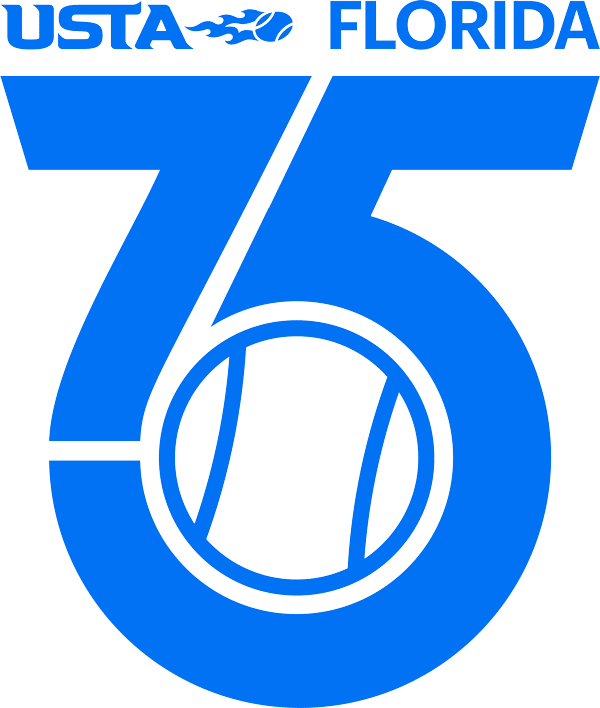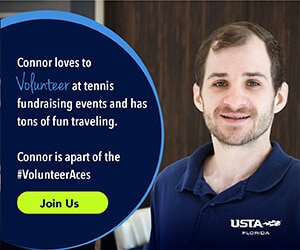“Change is inevitable, we need to reflect and refocus.”
Todd Rubinstein isn’t letting the impact COVID-19 has had on the world of tennis instruction slow him down.
“I’m just trying to do my part,” says the tennis teaching professional. “This is an unprecedented life test of epic proportions and the physical and mental well-being of not just my players, but of their families and everyone on a global scale, is primary.”
The South Florida tennis community staple has spent nearly 30 years in the industry as a coach. Rubinstein is a USPTA Elite and Accredited Professional Coach, a certified USTA High Performance Coach, the head tennis coach for the Mourning High Sharks and is the current USPTA Florida District 13 North Miami President. When the urgency around COVID-19 slowly began to grow in early March, Rubinstein didn’t waste any time – he leapt into action, took the bull by the horns, and started conducting virtual training sessions from his backyard. That was two weeks before the Florida governor enacted the state’s official stay-at-home order.
“I figured that we were going to be cooped up for the long haul and wanted to not just keep in touch with my players and others, but to also keep them actively involved, educated and inspired in a fun, interactive and informative way,” he shares.
The motivation to keep his athletes engaged and focused on tennis led him to create www.quarantinetennis.com, where Rubinstein shares “Todd’s 20 Second Tennis Tips”. The tips, while short, provide specialized information that can translate onto the court in a positive and practical way for every player – whether beginner or high performance.
https://www.facebook.com/quarantinetennis/photos/a.109746380682412/122868752703508/?type=3&__xts__%5B0%5D=68.ARD9L5dugk4Wf2K3aNTtkq7OfxmXk4AFsjUg2CN6J7LUkHxSLYlpRVzQhnDJUupJuoGlpc2k4qk34g-_j6-1lG2nScLvhPcjG-2bORcuZIy_TWr9zP749XjwbWCivKOCM3Rns3D_TMRbb3iVyWfYb1f9uB3dfO6MFsrWGbUNkXqDEzr5tDurX7Ut-eaFL4_CvNQc4qncr3X03-yKgSfLfNPGA7_9-kEqT99yoKdpuqcAlV3WH_dwwjmZZdiOCgOH-5HMY5eQp0rWl6FW5Gk5CN1XPIa_F6r7hUNaFwhYdEda5kSXOTmckDXDgmv-L0K4rciQaxtCK3tbxvTPMEROUksNCJVrizJoDtjigWxoLzULFEFHaagloTwQy7r8Ei0zmbPNCaokXVQ2Swg0_Ue5DqUx2lCeSlqwk72Ihu0TmNOM&__tn__=-R
“I focus on one specific facet of the game and in 20 seconds convey my message in a meaningful way in which the viewer will be able to comprehend and apply,” he says about the tips. “I feel this is a perfect way to connect with today’s generation.”
The only adjustment Rubinstein says he faced in the transition to virtual training was that he was in his backyard with a camera rather than out on the tennis court with his athletes. He says the bigger challenge was garnering interest in virtual learning and encouraging his athletes to be self-motivated.
“Not everyone has the technology to participate in a virtual training, so that is an obstacle in itself,” he explains. “Plans, goals, expectations and outcomes should be set and there also needs to be a certain trust factor between the coach and the athlete. It might take some time to get acclimated to ensure high-quality virtual training, but with adjustments, these challenges can be overcome.”
As days went by and players adjusted to the new style of learning, Rubinstein started to receive emails asking when the next 20-second tip would be released. Players were interested and invested, even sending in topic suggestions. The success inspired Rubinstein to extend an invitation to his participants to create their own tips.
“It’s a lot different watching a participant or client do a tip rather than a seasoned professional coach,” he shares. “Not only does it get the players actively involved with their individualized skill set, but it also gets them engaged in the game in a more personalized and fun way.”
https://www.facebook.com/quarantinetennis/videos/1341309882744478/
So far, virtual learning has met Rubinstein’s expectations, albeit with a few withstanding adjustments. The main goal was to stay connected with his athletes, who are his main focus.
“It’s all about them, especially their social-emotional and physical health,” he explains. “Whenever I share a lesson, a tip or even guidance in whatever platform or capacity, I’m creating an emotional experience; one that I hope equates to a positive experience so they not only learn and want to absorb more but also grow as an individual.”
Rubinstein emphasizes that it is important for his athletes and their families to stay active and engaged while at home. He encourages everyone to create a healthy at-home routine, to not only bring some stability and organization into their lives but also to help them cope with recent events.
“I’ve recommended to my players that aside from staying fit and eating as healthy as they can, they stay busy during this time and accomplish something they might have always wanted to do,” he says. “Accomplishment is an incredible motivator.”
He also hopes his virtual trainings and tips are helping to bring households together. For Rubinstein, the shake-up of the way he connects with his athletes has also brought his family closer together.
“My daughters Sofia and Victoria both help with the production of the tips and my wife helped come up with the name of ‘Quarantine Tennis’,” he says. “My daughters are having a blast and it keeps them involved in the game in a progressive way.”
https://www.facebook.com/quarantinetennis/videos/230787668292082/
It’s no secret that the COVID-19 pandemic has created ample change within the past two months. The transition to virtual learning has taken place on a worldwide scale in almost an immediate fashion, and society as a whole has practically been forced to adapt. Rubinstein expects to see virtual learning stick around for the long haul.
“I feel that virtual learning will become an exponentially necessary formality,” he states. “I think it will be used to enhance and facilitate the learning, overall growth and development of a player, and for that matter, anyone in every facet of life.”
As far as other tennis professionals who are looking to incorporate online trainings to engage with their athletes, Rubinstein advises now is the time to make that leap.
“If you aren’t already doing it, what are you waiting for?” he asks. “There is a light at the end of the tunnel, but there is no telling when we’ll be able to get back out on the courts as we could before.”
To check out Rubinstein’s 20-second tennis tips and online trainings, visit www.quarantinetennis.com or check out the Quarantine Tennis Facebook page.



